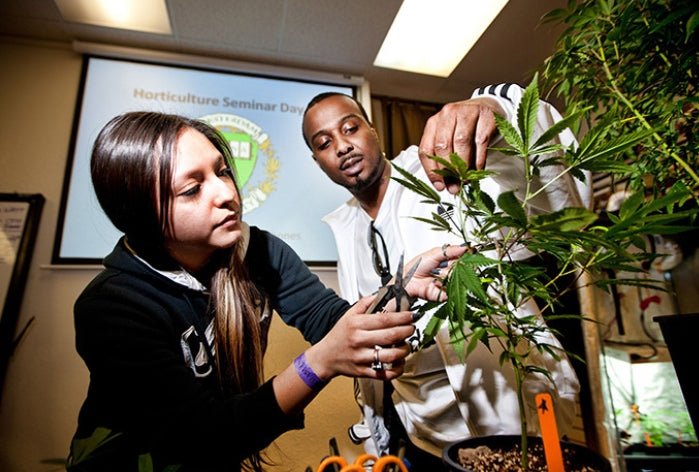According to a new Cornell University research study, higher concentrations of the hemp-based variants resulted in less plant damage from insects and other pests.

In his revolutionary work, “On the Origin of Species,” first published in 1859, Charles Darwin turned the scientific world upside down with his radical paradigm-shattering theory of evolution by natural selection.
According to the concept, individuals “with traits that enable them to adapt to their environments will help them survive and have more offspring, which will inherit those traits. Individuals with less adaptive traits will less frequently survive to pass them on. Over time, the traits that enable species to survive and reproduce will become more frequent in the population, and the population will change or evolve.”
While much of his work focused on the adaptive qualities within animal species, Darwin held that the same principle could also be applied to the plant world. Any living organism must adapt and evolve to survive, just like the unique and wide array of creatures from the Galapagos Islands, he detailed in his book.
Although it is uncertain whether Darwin was ever allowed to study the cannabis sativa plant and its two notable offspring, cannabis and hemp, he would most likely find the rugged and versatile plants perfect examples of his theory in practice. Hemp and cannabis have been around for millennia, and botanical archaeologists or archaeobotanists believe them to be some of the oldest cultivated plants in human history.
That type of longevity is a testament to the powerful adaptive qualities of hemp and cannabis, as well as to the value many cultures have placed on both throughout human history. One of those adaptive qualities is now being studied as a potential basis for developing more organic pesticides to battle the destructive nature of insects and pests.
As first reported by Hemp Today, researchers at Cornell University led by Larry Smart, a plant breeder and professor in the School of Integrative Plant Science at Cornell AgriTech’s College of Agriculture and Life Sciences (CALS), are discovering the untapped power of hemp-derived cannabinoids to potentially serve as the chemical foundation for pesticides to fend off the costly effects caused by pests.
Most of the scientific focus concerning cannabinoids has centered on their medicinal and intoxicating effects in the decades since researchers first identified them. However, scientists have never been able to clearly explain why hemp and cannabis began producing cannabinoids in the first place. Several theories abound, most postulating that they may protect plants from UV light, pathogens, and herbivores.
“It has been speculated that they are defensive compounds because they primarily accumulate in female flowers to protect seeds, which is a fairly common concept in plants. But no one has put together a comprehensive set of experimental results to show a direct relationship between the accumulation of these cannabinoids and their harmful effects on insects,” said Smart, who is the senior author of the study, which was published in the journal Horticulture Research last month.
"It has been speculated that they are defensive compounds because they primarily accumulate in female flowers to protect seeds, which is a fairly common concept in plants. But no one has put together a comprehensive set of experimental results to show a direct relationship between the accumulation of these cannabinoids and their harmful effects on insects.”
- Dr. Larry Smart, Plant Breeder, Professor and Sr. Author of the Cornell Univ. Study
Cornell began its hemp breeding program in 2017 to evaluate commercially available hemp cultivars and identify those best equipped to flourish and thrive in various climates, soils, and environments to make the best recommendations to farmers. During their research, Smart and his colleagues observed that specific varieties from a Ukrainian breeding program were all highly vulnerable to Japanese beetles because they did not produce cannabinoids. Other strains, which make them, were less susceptible.
“In the absence of cannabinoids, we saw heavy insect damage, and in the presence of cannabinoids, we saw much less damage,” Smart said.
Likewise, in controlled laboratory feeding studies, scientists isolated the cannabinoids CBDA and CBGA (when heated, they transform into the more familiar CBD and CBG) and painted the extracts onto an artificial insect diet in various concentrations. According to the paper, larvae grew less and had lower survival rates as cannabinoid concentration levels increased.
“The study gives us insight into how cannabinoids function in natural systems and can help us develop new THC-compliant hemp cultivars that maintain these natural built-in defenses against herbivores,” said George Stack, a postdoctoral researcher in Smart’s lab and the paper’s first author.
"The study gives us insight into how cannabinoids function in natural systems and can help us develop new THC-compliant hemp cultivars that maintain these natural built-in defenses against herbivores.”
- Dr. George Stack, Postdoctoral Researcher and the Study’s First Author
While the findings are exciting, particularly for the researchers involved, there is still much more work ahead before cannabinoid-based pesticides become a viable tool to thwart the damaging effects of pests. However, it is another powerful and hugely beneficial example of how resilient and valuable the hemp plant can be for providing medicinal relief to millions and protecting itself and potentially thousands of other plants from relentless insect attacks. Charles would be proud.







































